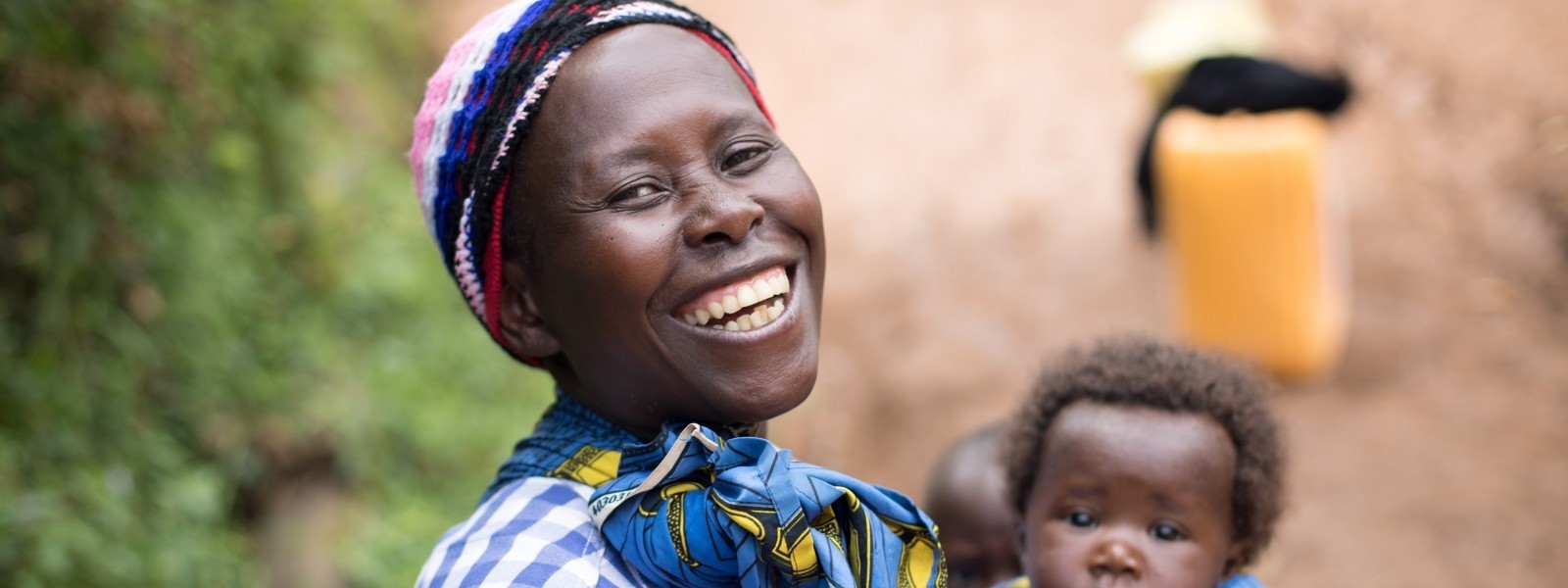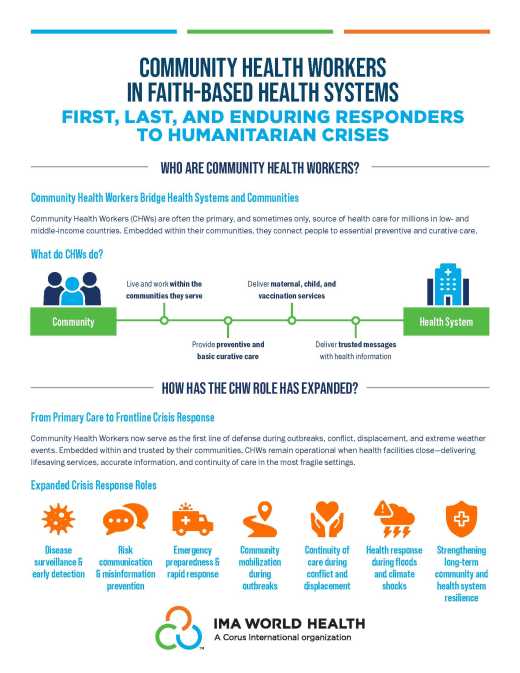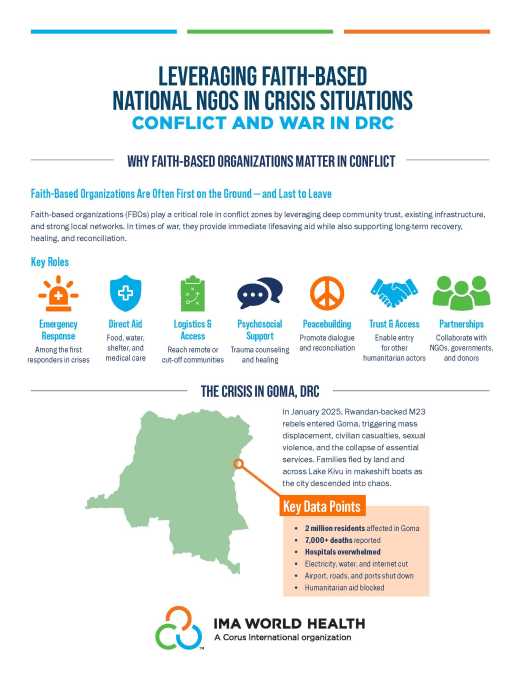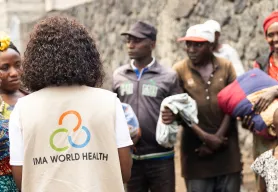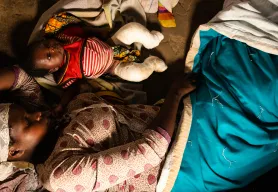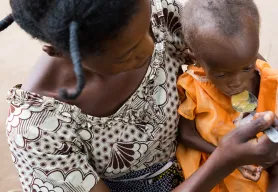The Democratic Republic of Congo (DRC) continues to face acute and complex humanitarian crises characterized by internal displacement and widespread insecurity. According to the World Bank, the mortality rate for children under-five remains one of the highest in the world at 62 deaths per 1,000 live births (2021). These causes of death, often preventable, are aggravated by high rates of malnutrition, lack of access to clean water and violence against women and girls.
Since 2000, IMA World Health (IMA) has been a key partner in the DRC’s development and humanitarian response, working alongside the Congolese government and local and international organizations, to revitalize the health system, improve WASH outcomes and fight disease. Through long-standing relationships with the Ministry of Health and a robust faith-based network, IMA has provided direct assistance in 251 health zones, consistently and distinctively operating in the country’s most remote and challenging areas where successive armed conflicts and political instability have demanded creativity and unparalleled local partnership.
As part of the Corus International family, IMA's work is also connected to fellow Corus organization Lutheran World Relief's rural economic development, livelihoods and food security programming. To learn more, visit Lutheran World Relief's DRC page.
Project Highlights
This global health initiative, funded by the Center for Disease Control (CDC) and led by IMA World Health in DRC and the Philippines, focuses on enhancing immunization program capacity. Identifying underserved populations, the projects implement targeted interventions to ensure equitable vaccine access. Key objectives include:
- Establishing comprehensive vaccine-preventable disease (VPD) surveillance systems.
- Improving preparedness and response to VPD outbreaks.
- Strengthening the quality and sustainability of immunization delivery systems.
These efforts are vital to achieving global VPD control, elimination, and eradication goals, such as polio eradication, measles and rubella elimination, hepatitis B elimination, and maternal and neonatal tetanus elimination. Ultimately, the project seeks to significantly reduce VPD-related morbidity and mortality, contributing to healthier communities worldwide.
IMA World Health leads the efforts of The World Bank's STAR-Est project in Goma, Bukavu, Beni, and Bunia to provide comprehensive prevention against and response services for violence against women and girls. IMA World Health supports psychosocial services, safe spaces, access to justice, and strengthening of the health sector, including distributing PEP Kits, training health care providers, and conducting robust monitoring and evaluation.
In early 2024, North Kivu, South Kivu, and Ituri saw a surge in sexual violence, with 81,050 cases reported, a 33% rise. IMA World Health, with EU support, are supplying 10 rural health zones in North Kivu with kits for 6,240 survivors. The project focuses on rapid access, HIV/STI prevention, and strengthening health systems and community awareness.
Led by IMA World Health and funded by the U.S. Department of State, MOMENTUM Integrated Health Resilience is a global health initiative focused on saving the lives of mothers and children in conflict and fragile settings.
MOMENTUM Integrated Health Resilience was originally launched in May 2020 as part of a suite of programs designed to holistically strengthen maternal, newborn, and child health (MNCH) worldwide. Working alongside local organizations, governments, and humanitarian and development partners, the project helped accelerate reductions in maternal, newborn, and child illness and death by increasing the capacity of host country institutions and local organizations to introduce, deliver, scale up, and sustain the use of evidence-based, quality MNCH care.
In 2025, the program refined its focus to deliver quality, integrated and life-saving health, nutrition, and WASH services to mothers and children, detect and respond to disease outbreaks, and distribute essential medicines and commodities. MOMENTUM Integrated Health Resilience is now being implemented in Bangladesh, Benin, Burundi, Democratic Republic of Congo, Ethiopia, Mali, Niger, Philippines, South Sudan, Sudan, Yemen.
Funded by the Global Fund to Fight AIDS, Tuberculosis, and Malaria (GFTAM), and in partnership with national NGO SANRU, IMA is implementing a seventh round of mass distribution initiatives to provide long-lasting insecticide-treated nets (LLINs) to all households in five provinces of the DRC. IMA continues to innovate and ensure high quality data collection from distributions and was the first organization in the DRC to leverage mobile technology to help the government and local partners track malaria incidence and maintain LLIN coverage. To support mass distribution campaigns, IMA recruits locally in each province to distribute LLINs and monitor follow-up activities.
DRC is facing a severe humanitarian crisis, particularly in Goma, North Kivu, where ongoing armed conflict, mass displacement, and a crumbling health system have contributed to an alarming surge in mpox, cholera, and sexual violence. These interconnected emergencies demand an urgent, coordinated response to contain outbreaks and support vulnerable populations in conflict-affected zones. Mpox response: IMA World Health supports vulnerable health zones and facilities, providing infection prevention and control (IPC) kits, strengthening community surveillance, and training health workers. Cholera response: IMA World Health equips cholera treatment centers, conducts rapid response, and improves WASH services. This intervention prevents further disease outbreaks, protects vulnerable populations, and supports community-led response mechanisms, laying the foundation for sustainable health resilience in North Kivu.
With funding from USAID's Office of U.S. Foreign Disaster Assistance (USAID/OFDA), IMA worked with longtime local partner SANRU to provide primary health care services free of charge to IDPs and other destabilized populations within the conflict-affected Kasai provinces in DRC, with an estimated target population of 1,689,561. Health care services were provided in 125 health centers. In total, 1,000,039 new patients received treatment, and despite insecurity, many health targets were met or exceeded thanks to the resilience and dedication of health workers IMA has supported through ongoing health systems strengthening programs. Diagnosis and treatment of diarrhea was provided to more than 93,000 patients, to over 560,000 patients for malaria, and to more than 152,000 patients with acute respiratory infections.
The Multisectoral Nutrition Project (Projet Multisectoriel de Nutrition et de Santé - PMNS) is strengthening nutrition outcomes for at-risk pregnant women and malnourished children in Kasai Province, DRC. With funding from the World Bank and the DRC's Ministry of Public Health, IMA World Health and its consortium of partners are providing nutrition services at the community level, strengthening prenatal consultations as well as revitalized preschool consultations including improved routine micronutrient supplementation, and supervising systemic intensive screening and structured home visits by community health relays. The DRC's Ministry of Health and National Nutrition Program (PRONANUT) are included in all training, monitoring and evaluation, and supervision activities to encourage synergy. Within the project, IMA World Health employs its experience supporting village savings and loan associations (VSLAs), improved cook stoves, and entrepreneurship and leadership opportunities that promote home gardening and income-generating activities for women. IMA World Health's consortium of partners for the PMNS project includes the Adventist Development and Relief Agency (ADRA), SANRU, Programme for the Development of Eastern Kasai (PRODEK), and the Congo Leadership Initiative (CLI).
To date, the project has reached 408,068 children aged 0-59 months with preschool consultations and screened 26,473 children for acute malnutrition. In the first quarter of the project (August–Sept 2023), 257,125 children aged 0-23 months received a preschool consultation, 26,473 children 6-59 months were actively screened for acute malnutrition, 787,624 home visits were made by community relays to follow up with families of children screened for/diagnosed with malnutrition, and 2,986 cooking demonstration sessions were held in communities.
The SEMI project builds on a decade of health system strengthening investment by UK Aid in the DRC through the IMA-implemented ASSP and ASSR projects. Since 2014, IMA has been working to increase access to and quality of primary health care. In project areas, close to 100% of pregnant women now deliver at health centers compared to 62% in 2014. The FCDO-funded SEMI project focuses on improving access to essential maternal, newborn, child and adolescent health services, promoting rights-based family planning services, and strengthening the health system in the areas of community governance, human resources for health, drug supply chain management, health information system quality and completeness, and public finance management. To date, the SEMI project has supported 936,177 patients with curative services. Four doses of intermittent preventative treatment (IPT) for malaria have been given to 25,717 pregnant women during antenatal visits, and 52,882 deliveries (96% of all deliveries in Kasai province) have been assisted by a skilled attendant.
Funded by USAID's Bureau for Humanitarian Assistance, IMA has procured and distributed post-exposure prophylaxis (PEP) Kits in the DRC since 2018, improving the supply chain for PEP Kits in up to 16 provinces with a high prevalence of violence against women and girls. IMA employs a multi-pronged supply and distribution strategy which increases access, reduces stock-out, and reduces cost per kit through a cost-effective bulk procurement and local kitting solution. Through this approach, IMA has cumulatively purchased, kitted and distributed over 107,800 PEP Kits, dramatically increasing access to life saving medication for survivors of sexual violence. Complementarily, the project trains health care providers in violence against women and girls survivor care, supports PEP Kit administration, supply chain management, tracking and monitoring, and strengthened coordination among humanitarian actors and local partners.
Funded by USAID, the C-violence against women and girls project (known in Swahili as "Tushinde Ujeuri") supports communities in eastern DRC to prevent and respond to violence against women and girls with the goal of reducing violence, combatting stigma and improving holistic care for survivors. Building on the highly successful USAID-funded Ushindi program implemented by IMA (2010-2017), the C-violence against women and girls project provides urgent medical care, psychosocial counseling, legal support, and socioeconomic support (access to village savings and loan associations, literacy circles, and women’s empowerment groups) to help survivors gain financial independence and social support. Together, these activities restore health, dignity, justice and opportunity to survivors. To date, the project has reached close to 800,000 community members with violence against women and girls prevention information; more than 10,000 survivors have received psychosocial support; and more than 2,000 have received post-exposure prophylaxis (PEP) Kits to prevent HIV following assault.
Through its longstanding presence in eastern DRC, IMA has actively responed to humanitarian crises alongside the Corus International family of organizations.
- Nyiragongo Volcano response (May 2021): IMA responded to immediate needs of displaced individuals and overburdened health facilities. IMA supplied essential medicines to four health facilities and distributed 5,958 blankets and 45 water filtration systems.
- Resurgence of armed conflict (June 2022): IMA responded to mass internal displacement by supporting 16, 380 individuals and six health facilities used by the displaced population and host communities. IMA support included essential medicines, medical equipment, infection prevention and control supplies, water filtration devices and blankets.
Cholera prevention (February 2023): Responding to continued internal displacement, IMA provides humanitarian assistance in the form of food and non-food distributions (including blankets), while supplying essential medicines and building latrines and showers to improve WASH situations and support cholera prevention.
During eight years of implementation, ASSP and its follow-on project ASSR improved the health of women, adolescents and children through support for disease prevention, delivery of health care and health systems strengthening. With funding from the UK’s Foreign, Commonwealth & Development Office (FCDO), the projects supported an estimated 9.7 million people across 52 health zones in five provinces, strengthening the health system by focusing on priority interventions such as the treatment of malaria, pneumonia and diarrhea; nutrition; obstetric and neonatal care; family planning; immunization; and water, sanitation and hygiene (WASH). Using an approach based on the World Health Organization’s six pillars of health systems strengthening, the projects collaborated with the Ministry of Health (MOH) at all levels of service delivery, including the national and provincial levels and with focused support to health zones, health facilities and communities. The projects allowed for 2.23 million births to be attended by skilled health personnel at health facilities. More than 13 million nets were hung through bed net campaigns. 286 health centers were built, including 109 newly constructed health centers during ASSP. 4.78 million children were screened for malnutrition and over 1.35 million pregnant women and children under five received direct and intensive nutrition interventions. Additionally, the projects promoted and strengthened the open-source health data management system DHIS2 to improve data dissemination and to improve decision-making for health service delivery.
IMA’s leadership in the 2018-2020 Ebola outbreak response included delivery of nearly $1 million in personal protective equipment (PPE) to frontline healthcare workers, the establishment of 78 Ebola triage and isolation units, and installation of water supply and hygiene systems at 164 health clinics. Funded by USAID's Office of U.S. Foreign Disaster Assistance (USAID/OFDA), IMA’s Ebola Virus Disease in North Kivu and Ituri: Strengthening Community Prevention, Response, and Recovery project supported community-based prevention and response in 25 of the most affected health areas, where more than 387,000 people were at risk. This included extensive training in community-based surveillance and training more than 1,000 religious and community leaders on Ebola messaging, a key strategy for building community trust.
Further, IMA and its partners ensured the continuity of essential health services during this severe, prolonged humanitarian crisis. IMA continued to support Ebola containment and recover with the Ebola Virus Disease in DRC: Strengthening Community Prevention, Response, and Recovery project. IMA led a comprehensive Ebola prevention and response program in 10 health zones of eastern DRC that addressed the issues of insufficient health services, lack of trust in the response and in communication around the disease, and inadequate prevention and control measures. IMA’s multi-pronged program addressed urgent needs to end the Ebola epidemic and prevent its resurgence through community outreach and mobilization, social and behavior change communications in schools and places of worship, health facility-based infection prevention and control, WASH and waste management in health facilities, and a “wrap around” strategy which provided critical training, supplies, and support to implement a primary healthcare (PHC) package addressing leading drivers of maternal and child mortality.
With funding from USAID's Office of U.S. Foreign Disaster Assistance (USAID/OFDA), the Greater Kasai Health Care and Food Security Recovery Plan in DRC project addressed key challenges in health care and food security resulting from conflicts in Kasai and Kasai Central provinces of DRC. Its multi-pronged approach targeted key areas for recovery and resilience, including food security, health care and related water, sanitation and hygiene improvements. Collaborating with longtime local partner SANRU, IMA worked to restore the functionality of health facilities that were burned and/or looted, including replacing lost equipment and rehabilitating WASH infrastructure. The program also sought to build financial sustainability in the health system and lessen undue burden on already vulnerable populations with a gradual transition back to user fees for health services, as well as support vulnerable households facing food insecurity by assisting families in food production and linkages to markets.
The ENVISION project, funded by USAID and led by RTI International, aimed to empower governments of endemic countries to lead NTD control programs and scale up the delivery of preventive chemotherapy for the seven most common NTDs. In the DRC, as an implementing partner, IMA supported the DRC NTD control program to conduct annual MDA of three medications, reaching more than 500,000 people in six zones in northern Maniema Province in 2015-2016 and in three zones in 2017, with the goal of treating 80 percent of the population for LF, onchocerciasis, schistosomiasis and STH. Transitioning with USAID’s updated strategy for DRC in 2018, IMA conducted rapid assessments and mapping surveys to find the extent of trachoma in suspected regions of the country.
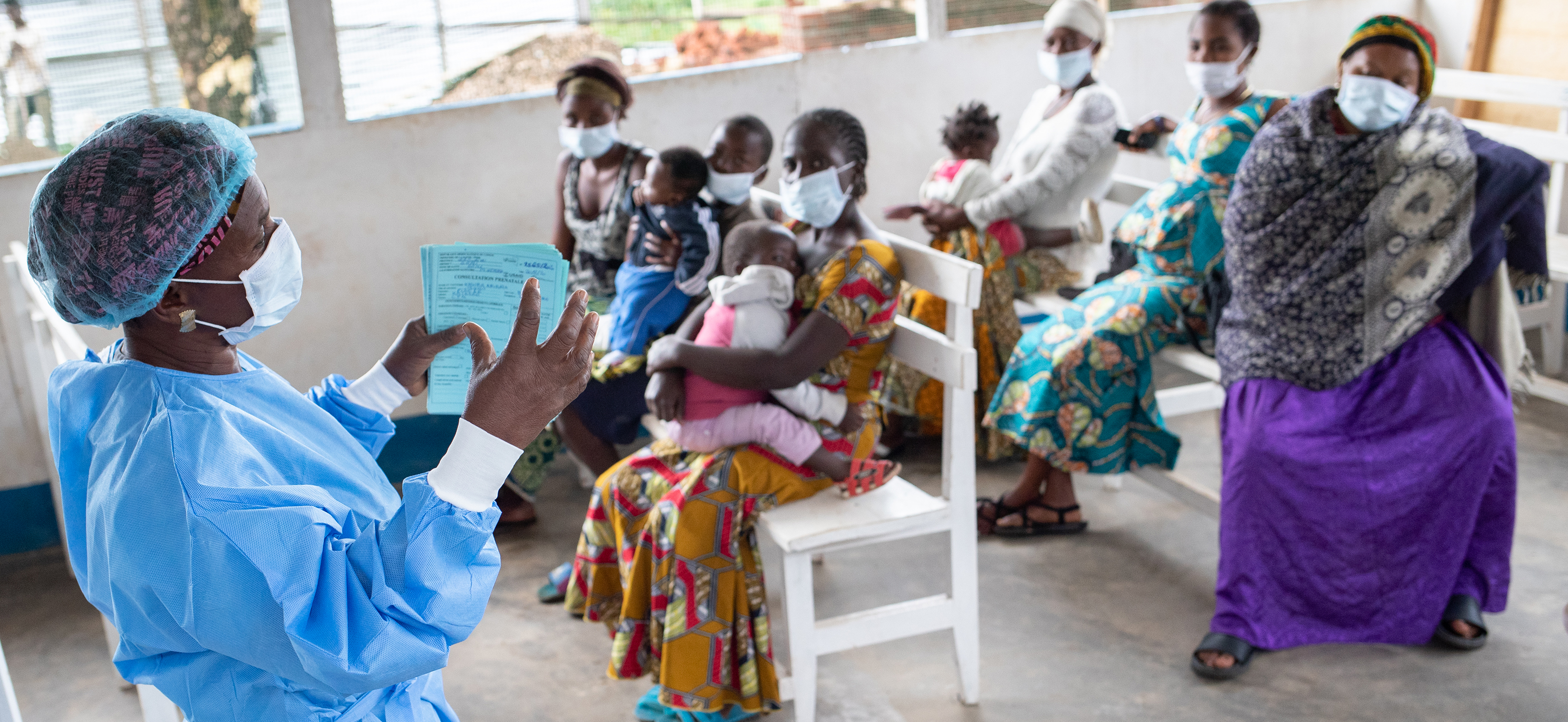
The Corus Effect
Founded in 1960, IMA World Health is part of Corus International, an ensemble of long-serving, global leaders in international development and humanitarian assistance committed to ending poverty and building healthy communities across Asia, Latin America and the Caribbean, the Middle East, and Africa.
In addition to IMA World Health, the Corus family includes global aid and development organization Lutheran World Relief, U.K.-based technology for development company CGA Technologies, impact investing firm Ground Up Investing, and direct trade company Farmers Market Brands.
Alongside communities and local partners in fragile settings, our dedicated experts across our organizations integrate disciplines, approaches and resources to overcome global health challenges, develop productive and stable economies, improve resilience in the face of climate change, and respond to natural disasters and humanitarian crises. We invest in solutions that are innovative, scalable, holistic and move the needle towards transformational change.


